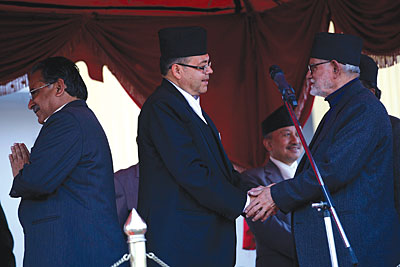 MIN RATNA BAJRACHARYA |
The latest twist in Nepali politics reminds one of the fable of the goose and the golden egg. A farmer has a goose that lays a golden egg every day. But greed overtakes the farmer, who wants all the gold at once. So he kills the source of his greatest fortune and we all know what he found.
The only change to that famous tale in Nepal's context is that the goose has hit back, and in what style. Instead of gold, rotten eggs are on the faces of all those within and outside the country who thought they had cornered the goose�Maoist Chairman Pushpa Kamal Dahal� to extract more concessions from him. They had the one-point agenda of doing everything they could to prevent Dahal from becoming prime minister.
Dahal, the goose, had finally started delivering on his promises after refusing for over two years. This, despite being under tremendous pressure from within his party, with the Mohan Baidya faction forcing the official party goal towards revolt and Baburam Bhattarai beginning a series of notes of dissent.
Of course Dahal's track record on honouring even written commitments is not impressive. He has the proven reputation of saying three different things to three different people on the same topic, all within a span of six hours.
But in politics you cannot have permanent enemies (or friends). So even when he started delivering (official handover of his party-controlled army to the government) and agreed to the integration/rehabilitation package suggested by caretaker Prime Minister Madhav Kumar Nepal at Gokarna Resort on 26 January, NC and UML reverted to their old stance of 'everything now and here'. We lost a very good opportunity to resolve the thorny issue of combatant integration and power-sharing.
Something happened between the 26 January Gokarna meeting and the follow-up at Hotel Radisson on 28 January. Those in the know say it was NC's Krishna Sitaula, one of the members of the taskforce formed to work on the modality of integration/rehabilitation, who spoiled the atmosphere. He insisted that the Maoists first agree on all of NC/UML's conditions before they could claim leadership of the consensus government. The Maoists hardened their position, saying they wouldn't accept any pre-conditions to leading a consensus government. Ram Chandra Poudel and Sher Bahadur Deuba of NC and UML chief Jhala Nath Khanal were more than happy for the chance they got to stake their own claims to the prime ministership.
So what did the modern goose do? It effected one of the most outrageous deals in Nepali politics. So outrageous that it has just one destination: the dustbin. The two communist chiefs have agreed to something that is clearly beyond their mandate and authority.
But the question we need to ask is not to do with the contents of the secret seven-point agreement between Dahal and Khanal. The question is how and why the agreement of Gokarna was torpedoed and in whose interest.
There's a lesson here for the Indian political leadership as well. Nepal's case is a classic example of how you can screw it all up. If you leave everything to the babus in the Ministry of External Affairs and intelligence officials, this is what you get. The one-point agenda of 'No Dahal' is silly. There needs to be a review of this approach.
In the meantime, NC needs to reach out to Dahal and his party. This is in the best interest of the peace process and constitution-writing. Only those who have a personal axe to grind (or vested interests) will find fault in this approach.
[email protected]
READ ALSO:
Slap-happy: (ADJ.)dazed, silly, or incoherent from or as if from blows to the head, EDITORIAL
Trial by fire, PRASHANT JHA
Khanal the Trojan, KANAK MANI DIXIT



